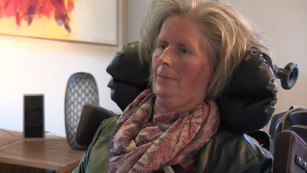
In 2008, mother of three Hanneke de Bruijne was diagnosed with amyotrophic lateral sclerosis (ALS), also known as Lou Gehrig's disease.
Over the next eight years, her life would change significantly as the nerves controlling her bodily movements degenerated. She would lose the ability to move her legs, arms, fingers and eventually even her face, leaving her locked inside her body, barely able to communicate with those around her. Breathing would require a mechanical ventilator.
Until recently, her main mode of communication had been through blinking and occasionally using an eye-tracking device to signal what she was thinking or wanted to say.
But a new form of brain implant is helping her regain control of her communication -- and her life -- by giving her the ability to compose entire sentences directly from her brain.
In a new case study, published in the New England Journal of Medicine on Saturday, researchers from University Medical Center Utrecht in the Netherlands highlight the success of their fully implanted brain-computer interface. The interface acts as an effective line of communication between locked-in patients and the outside world.
"This works everywhere, and so she feels much more confident to go outside," said Nick Ramsay, professor of neuroscience at the Brain Center Rudolf Magnus, part of University Medical School Utrecht. Ramsay led the research.
The device was implanted in Dutch-born de Bruijne, now 59, in October 2015 and has given her accurate and independent control of a computer typing program to put messages together, based solely on her brain activity.
"This is a world first," Ramsay said. "It's a fully implantable system that works at home without need for any experts to make it work."
Life locked in
ALS is now a familiar term for people worldwide after the success of 2014's Ice Bucket Challenge, which saw thousands of people throwing freezing buckets of cold water over their heads to raise money for -- and awareness of -- the disease.

Many people affected by the disease become trapped inside their bodies, with all the same thoughts and desires they always had, but without the ability to deliver them due to the degeneration of the motor neurons that control their muscle movement.
The ALS association estimate that more than 6,000 people are diagnosed with the condition in the US each year, with 20,000 living with it at any one time. There is no cure.
Not everyone with ALS loses the ability to communicate, but 80% will experience at least some difficulties, according to the Motor Neuron Disease Association.
"We wanted to give these patients back their dignity," Ramsay said.
Many other diseases and conditions can also lead to someone becoming locked into their body, including multiple sclerosis, brain stem strokes and accidents that result in an injured and dysfunctional nervous system. All outcomes involve losing control of your body. "It's a completely harrowing situation ... as people are still cognizant," Ramsay said.
Source: CNN
Source: CNN
No comments:
Post a Comment